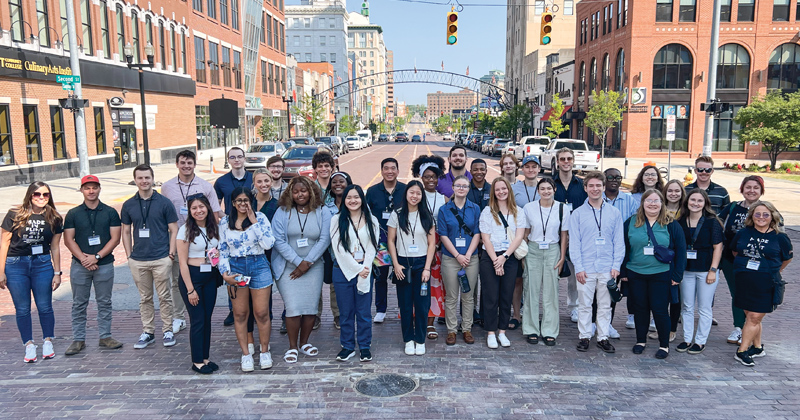
Jacob Pickett grew up in Flint, but it took a summer internship here to really appreciate his hometown.
“I love how the internship program sheds light on the positives of Flint because so many people only hear about the negative,” said Pickett, a political science major at Michigan State University (MSU). “Many people wish to move out, but I find myself looking for ways to incorporate my career plans and goals in Genesee County.”
Pickett was one of a dozen MSU undergraduates in the university’s 2023 Flint Study Away Internship Summer Program through the College of Social Science. Unlike studying abroad where colleges send students overseas, study away programs offer courses and internships at locations within the United States.
For college students, internships are a great way to put book learning into practice. For employers, internships are a way to fill their entry-level talent pipeline – and preview future employees.

But Flint Study Away has an added bonus: Student interns take part in community projects aimed at addressing the city’s most pressing needs. The eight-week internships can also spur a greater appreciation for the city, its residents, and its amenities.
MSU’s College of Social Science has long supported active engagement within Michigan, given both faculty interest and large numbers of students who want to connect with local communities like Flint and Detroit.
“This type of immersion experience in a community is wonderful to observe and we continue to witness measurable impacts both on the students and in the projects they contribute to while in Flint,” said Oumatie Marajh, assistant dean at MSU’s College of Social Science and director of experiential learning.
The program is growing in popularity; 18 interns are slated for the 2024 cohort in majors ranging from psychology and political science to computer science and social policy, said Cathy White, Flint Study Away program coordinator.
“We’re excited to see an upward trajectory in interest from students as well as community partners interested in hosting an intern,” White said.
MSU’s School of Social Work also offers a sister program called the Flint Community Initiative. That internship program pairs students and leaders of nonprofit and civic organizations to engage in community development projects that contribute to a thriving future for Flint residents.
Flint community groups continue to welcome student interns and provide meaningful workplace experiences in both programs, Marajh said. It’s a win-win all around.

“We look forward to continued growth by increasing the partnerships within the city and bringing these wonderful opportunities to the students at Michigan State University,” Marajh said.
Participating employers this summer include the Genesee County Clerk’s Office and Prosecutor’s Office, The Disability Network, Communities First, Inc., Peckham, Inc., Hurley Medical Center, the MADE Institute, East Side Community Center, Flint & Genesee Group, and Voices for Children Advocacy Center.
Communities First is a Flint nonprofit working to build vibrant communities through economic development and affordable housing. Its leaders were so pleased with the Study Away program that they’re bringing on two MSU interns this summer.
“We’re big believers in helping to support and create the next generation of people who want to be passionate about this work,” said Joel Arnold, planning and advocacy manager at Communities First. “These are opportunities to let people get in on the ground floor, really see what this kind of work is like, and, hopefully, they’ll feel a passion for it that translates into a career.”
Communities First interns engage with the community, meet people, conduct research on policy issues, and manage programs.
“It’s certainly not getting anybody coffee or making copies,” Arnold said.
For Olivia Feldman, 22-year-old MSU psychology major who interned last year at Voices for Children Advocacy Center, the program was so impactful that she’s returning this summer. This time, she has a Flint Study Away internship at the MADE Institute, which serves at-risk youth and formerly incarcerated residents in Flint.
“I had jobs before, but I never worked like in a professional setting where I had so many different roles to balance,” Feldman said. “It was really good practice for what my life might be like after graduating.”
Feldman commuted four days a week from West Bloomfield and enjoyed her time in Flint – a city she’d barely known before. She had the chance to meet other interns from East Lansing and around the country through a program called Flinterns.
Available to employers of all sizes and industries, Flinterns aims to introduce local interns to all that Flint & Genesee has to offer by connecting students to each other and the region. If people feel connected, they’re more likely to stay in a community, according to Brianna Mosier, executive director of Flint & Genesee Education & Talent, which houses the Flinterns program.

“People can find a job anywhere. But if they feel a connection, or a sense of purpose to live in a community where they can make a difference, that’s really important,” she said.
Well-rounded, high-quality internships can help combat so-called “brain drain,” or the mass exodus of college-educated professionals to other states.
That’s important in Michigan, where long-term population losses could come to a head in the coming years, according to an April report from the Michigan Center for Data and Analytics. The report forecasts the state population could decline by nearly 700,000 residents by 2050.
MSU student David Luc said his internship last summer at the Charles Stewart Mott Foundation helped him gain a better understanding of philanthropy and grant-making. The city itself also made an impression.
“I think that the downtown area is an exciting and fun area with a very close-knit community feel to it; everyone always seems to know everyone when they’re walking around,” said Luc, who graduated in April.
Luc said he’d consider working in the region someday.
“If a hybrid position became available with an organization that’s the right fit for me, I would be excited to explore that opportunity,” he said.
Pickett, who interned last summer at the Genesee County Clerk’s Office, couldn’t agree more.
“There’s so much to love in the area … it’s almost impossible not to want to work (here) for me,” Pickett said.
